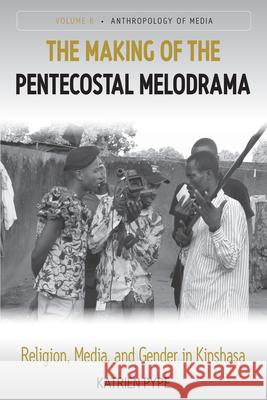The Making of the Pentecostal Melodrama: Religion, Media and Gender in Kinshasa » książka
The Making of the Pentecostal Melodrama: Religion, Media and Gender in Kinshasa
ISBN-13: 9781782386810 / Angielski / Miękka / 2014 / 348 str.
The Making of the Pentecostal Melodrama: Religion, Media and Gender in Kinshasa
ISBN-13: 9781782386810 / Angielski / Miękka / 2014 / 348 str.
(netto: 128,78 VAT: 5%)
Najniższa cena z 30 dni: 134,94
ok. 30 dni roboczych
Dostawa w 2026 r.
Darmowa dostawa!
"Pype's book is a contribution to 'anthropology of media', an upcoming sub-discipline of cultural studies, and this (but not only this) makes this publication so important., and] inspiring." - PentecoStudies "By offering a vibrant ethnography of the trajectories of evangelizing TV actors', their personal ambitions, anxieties, and disagreements with one another, Pype deconstructs the content of the melodrama...the ethnography offers insight into the role of religious media in the public sphere and its impacts on morals, even in secularized societies." - Sociology of Religion "Pype proposes a very innovative understanding of the continuum between artistic and moral dimensions of media production/consumption. For this, she uses the problem of gender as a critical guideline to understand the continuities and disruptions provoked by the 'Pentecostal melodrama'. From this perspective, this book...moves beyond the mere analysis of Pentecostalism as a phenomenon in itself, placing it within a wider, more fruitful scope of reflection." - Social Anthropology/Anthropologie sociale "Theoretically literate, based on superb ethnography, this book provides one of the best studies of television we have yet in African studies... that] promises to open up a new field of analysis and define the standards for how this research is to be conducted...a landmark that will make a significant contribution to some of the main fields in African studies and anthropology." - Brian Larkin, Columbia University " A] tour de force. This very elegantly and evocatively written ethnography of Congolese television drama is a path-breaking example of what it means to conduct and construct a thick description of a culture of media production." - Debra Spitulnik Vidali, Emory University "This book is beautifully written, theoretically sophisticated, nuanced in its analysis and empirically rich. Given that so much has already been written on African Pentecostalism, coming up with something original and new to say on the topic is quite a challenge, but Pype pulls it off and deserves a lot of credit for that." - Martin Lindhardt, University of Copenhagen "The author deserves great praise for the original way in which she moves her analysis beyond a mere observation of African Pentecostalism. This ethnographically grounded book not only captures the heterogeneity that marks Kinshasa in a beautiful way, but it also innovatively combines three currently burgeoning fields within anthropology: the anthropology of urban settings, the anthropology of youth, and the anthropology of media." - Filip De Boeck, University of Leuven How religion, gender, and urban sociality are expressed in and mediated via television drama in Kinshasa is the focus of this ethnographic study. Influenced by Nigerian films and intimately related to the emergence of a charismatic Christian scene, these teleserials integrate melodrama, conversion narratives, Christian songs, sermons, testimonies, and deliverance rituals to produce commentaries on what it means to be an inhabitant of Kinshasa.
"Pypes book is a contribution to anthropology of media, an upcoming sub-discipline of cultural studies, and this (but not only this) makes this publication so important.,,[and] inspiring." · PentecoStudies"By offering a vibrant ethnography of the trajectories of evangelizing TV actors, their personal ambitions, anxieties, and disagreements with one another, Pype deconstructs the content of the melodrama...the ethnography offers insight into the role of religious media in the public sphere and its impacts on morals, even in secularized societies." · Sociology of Religion"Pype proposes a very innovative understanding of the continuum between artistic and moral dimensions of media production/consumption. For this, she uses the problem of gender as a critical guideline to understand the continuities and disruptions provoked by the Pentecostal melodrama. From this perspective, this book...moves beyond the mere analysis of Pentecostalism as a phenomenon in itself, placing it within a wider, more fruitful scopeof reflection." · Social Anthropology/Anthropologie sociale"Theoretically literate, based on superb ethnography, this book provides one of the best studies of television we have yet in African studies...[that] promises to open up a new field of analysis and define the standards for how this research is to be conducted...a landmark that will make a significant contribution to some of the main fields in African studies and anthropology." · Brian Larkin, Columbia University"[A] tour de force. This very elegantly and evocatively written ethnography of Congolese television drama is a path-breaking example of what it means to conduct and construct a thick description of a culture of media production." · Debra Spitulnik Vidali, Emory University"This book is beautifully written, theoretically sophisticated, nuanced in its analysis and empirically rich. Given that so much has already been written on African Pentecostalism, coming up with something original and new to say on the topic is quite a challenge, but Pype pulls it off and deserves a lot of credit for that." · Martin Lindhardt, University of Copenhagen"The author deserves great praise for the original way in which she moves her analysis beyond a mere observation of African Pentecostalism. This ethnographically grounded book not only captures the heterogeneity that marks Kinshasa in a beautiful way, but it also innovatively combines three currently burgeoning fields within anthropology: the anthropology of urban settings, the anthropology of youth, and the anthropology of media." · Filip De Boeck, University of LeuvenHow religion, gender, and urban sociality are expressed in and mediated via television drama in Kinshasa is the focus of this ethnographic study. Influenced by Nigerian films and intimately related to the emergence of a charismatic Christian scene, these teleserials integrate melodrama, conversion narratives, Christian songs, sermons, testimonies, and deliverance rituals to produce commentaries on what it means to be an inhabitant of Kinshasa.











